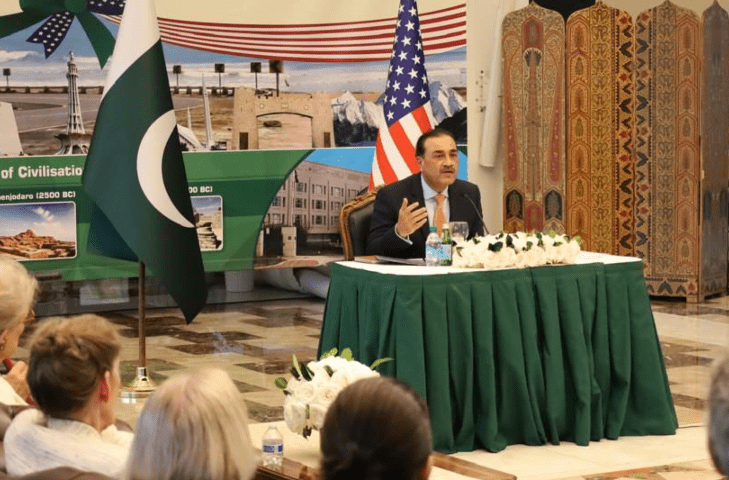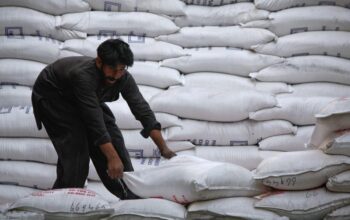By Staff Reporter
ISLAMABAD: Pakistan’s military leader, Field Marshal Asim Munir, pressed for a deeper partnership with the United States during a high-profile visit to Washington this week, pitching expanded cooperation on security, economic growth, and regional stability amid escalating global tensions.
Munir, the Chief of Army Staff, met President Donald Trump over lunch, becoming the first serving Pakistani army chief to hold face-to-face talks with a sitting US president. Accompanied by National Security Advisor Lt. Gen. Muhammad Asim Malik, also the country’s intelligence chief, Munir used the visit to signal a potential turning point in US-Pakistan relations.
The Field Marshal used the visit to engage with some of Washington’s most influential voices and he sat down with prominent U.S. think tanks, strategic affairs institutions, senior scholars, analysts, policy experts, and representatives of leading international media outlets.
The military’s media wing, the Inter-Services Public Relations (ISPR), described the exchange as “comprehensive and candid,” signaling an effort to bolster understanding between the two nations at a time of rising global instability.
Munir pointed to the long-standing Pakistan-U.S. partnership, highlighting “historical convergences” in counterterrorism, regional security, and economic development as a foundation for future collaboration. “He underscored the immense potential for a broader, multidimensional relationship built upon mutual respect, shared strategic interests, and economic interdependence,” the ISPR said.
The visit unfolds against a backdrop of heightened tensions, particularly in the Middle East, where the Israel-Iran conflict has raised questions about potential U.S. military involvement.
Munir stressed Pakistan’s “unwavering commitment to regional peace and stability” and its “constructive role in fostering a rules-based international order,” framing his country as a steady partner amid global uncertainty.
“The Army Chief also provided a detailed exposition of Pakistan’s balanced approach to regional and global conflicts, advocating for dialogue, diplomacy, and adherence to international law,” the ISPR said. “He reaffirmed that Pakistan continues to play a responsible and proactive role in mitigating regional tensions and promoting cooperative security frameworks.”
A central theme of Munir’s remarks was Pakistan’s decades-long struggle against terrorism. He pointed to the “malign influence of certain regional actors in sponsoring and perpetuating terrorism as a tool of hybrid warfare,” a thinly veiled critique that he tied to specific operations.
Munir referenced the Marka-i-Haq and Operation Bunyanum Marsoos during the recent conflict with India, offering a detailed elaboration of “Pakistan’s perspective on terrorism, noting the malign influence of certain regional actors in sponsoring and perpetuating terrorism as a tool of hybrid warfare”.
“Pakistan has been on the front lines of the global war against terrorism, having rendered immense sacrifices, both human and economic, in pursuit of a safer and more secure world,” Munir said, underscoring the steep toll the country has paid.
Prime Minister Shehbaz Sharif has frequently cited the staggering cost: 90,000 lives lost and $150 billion in economic damages over the past few decades.
Beyond security, Munir extended an invitation to international partners, including the US, to tap into Pakistan’s economic potential.
“Field Marshal Asim Munir shed light on Pakistan’s remarkable untapped potential, particularly in the domains of information technology, agriculture, and its vast and underexploited reserves in the mining and mineral sectors,” the ISPR said. “He invited international partners to explore collaborative opportunities in these sectors to unlock shared prosperity.”
The pitch echoed themes from his discussions with Trump, suggesting a vision for a partnership that extends beyond military cooperation.
Munir also outlined Pakistan’s broader approach to a turbulent world. “The Army Chief also provided a detailed exposition of Pakistan’s balanced approach to regional and global conflicts, advocating for dialogue, diplomacy, and adherence to international law,” the ISPR said.
He reaffirmed Pakistan’s intent to play a “responsible and proactive role in mitigating regional tensions and promoting cooperative security frameworks,” a stance that carries particular weight as the US weighs its next moves in the Middle East.
The Washington audience responded positively, with participants noting the “openness and clarity” of Munir’s perspectives and praising Pakistan’s “consistent and principled policies,” according to the ISPR.
The session was hailed as a “positive step toward enhancing strategic dialogue between Pakistan and the United States,” reflecting a spirit of mutual understanding.
Copyright © 2021 Independent Pakistan | All rights reserved




